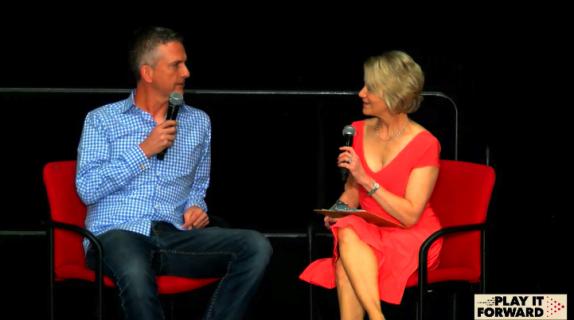BOSTON—“We didn’t do the future of sports journalism!” Bill Simmons cried toward the end of his one-on-one discussion with HBO’s Andrea Kremer. The Sports Guy was the final guest at the Play It Forward sports journalism conference at Boston University Friday afternoon and his appearance had been dubbed a conversation on the future of sports journalism. “What was the future?!?” he asked his host. “I thought we were gonna figure this out.”
Following a freewheeling 40-minute discussion that touched upon his grad school year at BU, the unveiling of his pop culture site The Ringer and what’s on his iPad, Simmons felt the subject ostensibly at the center of his appearance hadn’t been adequately addressed. So Kremer asked him: “What is the future of sports journalism?”
“I see the future as niche sites adding up to a larger whole,” he said. “It seems like people are becoming more and more focused on the one or two things they care about the most.”
Kremer pushed him. “But every major sport [already] has its own site,” she said. “So, what beyond that?
“I’m saying it gets even more focused than that,” Simmons responded.
If the answer was unsatisfactorily ambiguous, it underscores a larger point: For all his successes, Bill Simmons doesn’t know what the future of sports journalism will look like any more than the journalism students in the audience, some of whom no doubt have dreams of becoming the next Simmons.
He came to ESPN in the early aughts armed with a cavalcade of pop-culture references, a fan’s life-or-death passion and no shortage of self-assuredness. His “Boston Sports Guy” columns had already earned him a legion of cultish sports bro fans, but ESPN gave him the platform and the resources to develop into a full-blown media star. He had a 1960’s Celtics-like run of success: 30 For 30, The Book of Basketball, Grantland. Rolling Stone called him a “one-man vertical-integration engine.”
Now, two years after his departure from ESPN (an implosion which somehow now seems much more inevitable then it did at the time), Simmons is his own brand of thought experiment come to life: what happens when you take a transcendent star player and remove them from the infrastructure that helped send them into orbit?
The results so far are mixed. After signing a multi-platform deal with HBO, his show Any Given Wednesday barely got out of the starting blocks before being canceled 17 episodes in and The Ringer is still struggling to gain the cultural import Grantland had. Its web traffic numbers have garnered just a small percentage of what Grantland drew at its zenith. Still, the web site is only in its post-infancy and two Ringer-produced podcasts (The Ringer NBA Show and The Bill Simmons Podcast) are in the top five for sports podcasts on iTunes.
It took time for Grantland to establish itself too, and Simmons says there are plenty of lessons he learned from that experience that he’s using to guide the Ringer through an ever-changing media landscape.
“The design of the site was 100% my fault, but it was terrible,” Simmons said. “When we were conceiving Grantland there were no iPads yet. It was conceived for a desktop. We had this legendary designer design a site that kind of looked like The New Yorker which is a terrible idea for the internet but in 2011 it was like, ‘Oh this will work!’”
The magic of Grantland wasn’t so much Simmons’ talent, immense as it is, but his ability to identify and cultivate younger writers. It’s that skill for scouting that may end up dictating The Ringer’s long term success more than anything else.
He shared an anecdote about walking around the Grantland office in 2011 and noticing all the 20-somethings were using G-chat, Tweeting and listening to podcasts.
“Just watching the habits of how they interacted, what they cared about, it was just like a revelation for me and that’s when I realized…the young people are always there first. With The Ringer, we kind of doubled down on that. You make bets on younger people and you hope you can put them in the position to succeed and grow.”
For all the love he gives to his home town teams, Simmons once said Boston is “where I failed.” He had a famously hapless stint writing up high-school sports scores at the Boston Herald, but Friday at BU his main message to students was one of steely perseverance. In line at a meet and greet after the talk, he was overheard telling a star-struck sophomore unsure about her career path to ride it out a while. It was a message well-delivered from a guy who was bar tending into his 30s and now commands a multi-million dollar salary and a sports media empire.
“I was Generation X,” Simmons told the crowd. “Do you guys even know what that is at this point? It sucked…More people were coming out of college and more people wanted to do the same kinds of things and it was just really hard to find a job. I had a column in college…that was doing pretty well and at some point I said to myself ‘I want to do this. I want to write a column. I think I can get paid for this.’”
Like most self-assured proclamations Bill Simmons has made, he eventually turned out to be right.
Tags:













































__twocolumncontent.jpg)











